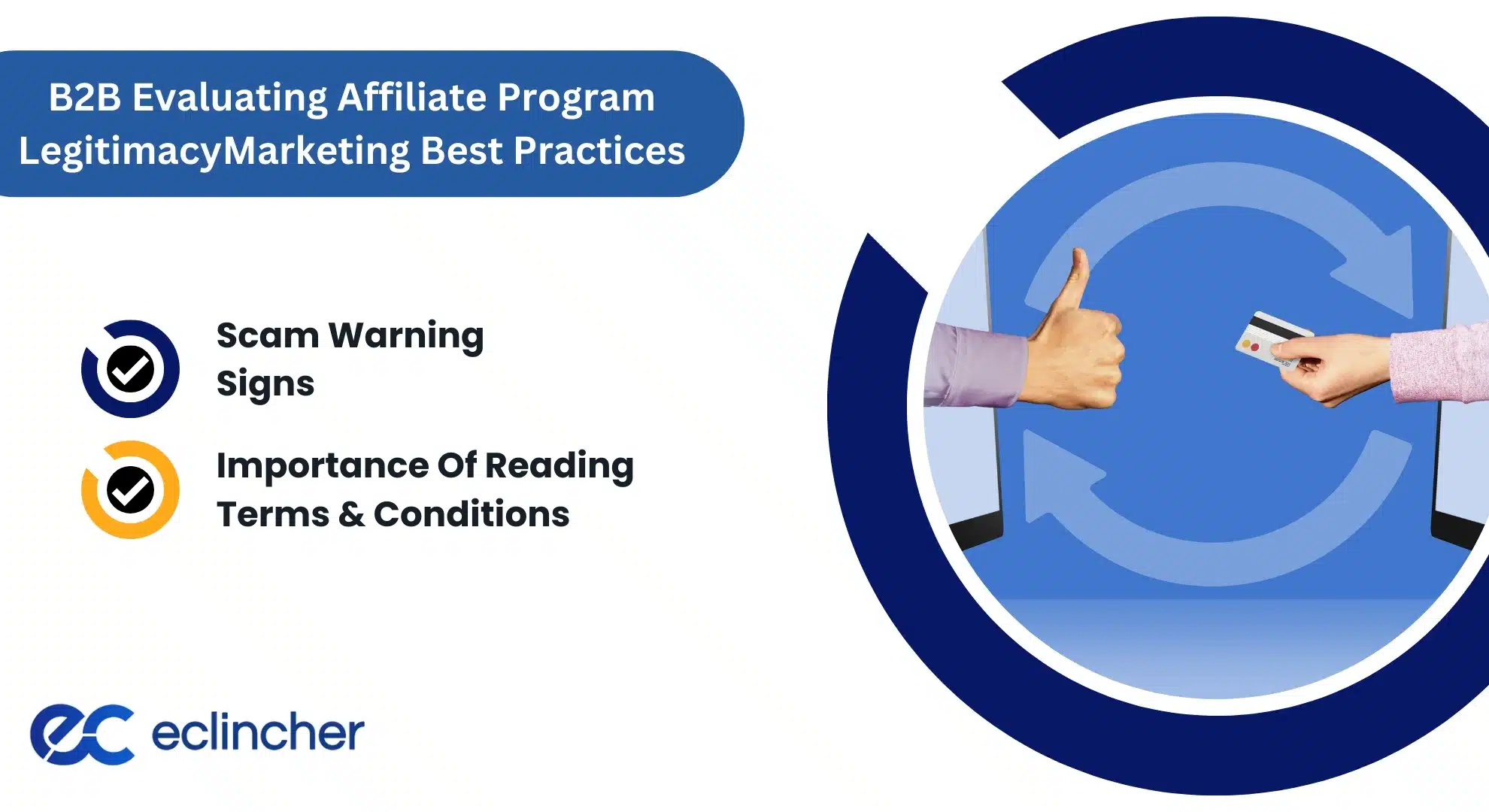Are Affiliate Marketing Programs Legit? Unveiling the Truth
Yes, affiliate marketing programs are legit. They provide a legitimate way for individuals to earn commissions by promoting products or services offered by businesses.
Affiliate marketing programs are a popular and effective way for companies to expand their reach and increase sales through the help of affiliates. By partnering with affiliates, businesses can benefit from increased brand exposure and customer acquisition. For affiliates, it offers an opportunity to earn passive income by promoting products they believe in.
However, it is essential for both parties to adhere to ethical practices and guidelines to ensure the success and longevity of the partnership.

Credit: eclincher.com
The Rise Of Affiliate Marketing
Affiliate marketing has experienced a remarkable rise in recent years, becoming a significant player in the digital marketing landscape. This marketing strategy allows individuals or companies to earn commissions by promoting other people’s or companies’ products. The rise of affiliate marketing is worth exploring, delving into its brief history and current trends.
A Brief History
Affiliate marketing dates back to the 1990s, with the concept pioneered by William J. Tobin, who launched the first affiliate program on the Prodigy Network in 1989. This marked the beginning of a new era in digital marketing, paving the way for businesses to leverage the power of affiliate partnerships to expand their reach and drive sales.
Current Trends In Affiliate Marketing
The landscape of affiliate marketing is constantly evolving, with several notable trends shaping its current state. Brands are increasingly turning to influencers and content creators to promote their products, capitalizing on their engaged audiences to drive conversions. Additionally, the rise of mobile commerce has led to a surge in mobile affiliate marketing, as consumers increasingly make purchases through their smartphones and other mobile devices.
How Affiliate Marketing Works
Affiliate marketing programs are legitimate partnerships where businesses pay individuals or other companies to promote their products. Affiliates earn a commission for driving traffic and sales through their unique tracking links. This online marketing strategy is a win-win for both parties involved.
Affiliate marketing is a popular way for businesses to promote their products or services. It involves partnering with an affiliate who promotes the business’s products or services in exchange for a commission. The affiliate is essentially a salesperson who earns a commission for each sale they make. In this section, we will explore the basic model of affiliate marketing and the roles and responsibilities of each party involved.
The Basic Model
The basic model of affiliate marketing involves three parties: the merchant, the affiliate, and the customer. The merchant is the business that offers the product or service. The affiliate is the person who promotes the merchant’s products or services to potential customers. The customer is the person who purchases the product or service.
The affiliate promotes the merchant’s products or services through various marketing channels, such as a website, social media, email marketing, or paid advertising. When a customer clicks on the affiliate’s unique tracking link and makes a purchase, the affiliate earns a commission. The commission rate varies depending on the merchant and the product or service being promoted.
Roles And Responsibilities
Each party involved in affiliate marketing has specific roles and responsibilities. Let’s take a closer look at each:
The Merchant: The merchant is responsible for creating the product or service and providing the affiliate with marketing materials, such as banners, text links, and product descriptions. The merchant tracks sales made by the affiliate and pays commissions accordingly.
The Affiliate: The affiliate is responsible for promoting the merchant’s products or services through various marketing channels. The affiliate must disclose their relationship with the merchant and ensure that their marketing efforts comply with relevant laws and regulations. The affiliate is also responsible for tracking sales and reporting them to the merchant.
The Customer: The customer is responsible for making a purchase through the affiliate’s unique tracking link. The customer should be aware that the affiliate will earn a commission for the sale.
In conclusion, affiliate marketing is a legitimate way for businesses to promote their products or services and for affiliates to earn a commission for promoting them. Understanding the basic model and the roles and responsibilities of each party involved is essential for success in affiliate marketing.
The Appeal Of Affiliate Marketing
Affiliate marketing programs are legitimate and offer a viable way to earn income online. By promoting products or services through affiliate links, individuals can earn commissions on sales. Many reputable companies offer affiliate programs, providing a genuine opportunity for individuals to generate income through marketing efforts.
Affiliate marketing is a rapidly growing industry that offers benefits for both affiliates and merchants. It has become a popular choice for individuals looking to generate passive income and for businesses seeking to expand their reach and increase sales. In this section, we will explore the appeal of affiliate marketing and the advantages it offers to both affiliates and merchants.
Benefits For Affiliates
Affiliate marketing provides numerous benefits for individuals who choose to become affiliates. Here are some of the key advantages:
1. Flexibility: Affiliates have the freedom to work from anywhere in the world and at any time that suits them. Whether you are a stay-at-home parent or a digital nomad, affiliate marketing allows you to set your own schedule and work at your own pace.
2. Passive Income: One of the biggest appeals of affiliate marketing is the potential to earn passive income. Once you have set up your affiliate links and promoted the products or services, you can continue to earn commissions on any resulting sales without the need for constant active effort.
3. Low Startup Costs: Unlike starting a traditional business, affiliate marketing requires minimal upfront investment. There are no product development costs or inventory to manage. All you need is a website or a platform to promote the products or services and an audience to reach.
4. Wide Range of Products and Services: Affiliate marketing allows you to choose from a vast array of products and services to promote. This means you can select products that align with your interests, passions, and target audience, making it easier to create compelling content and drive conversions.
Advantages For Merchants
Affiliate marketing is not only beneficial for affiliates but also for merchants who are looking to boost their sales and expand their customer base. Here are some advantages that merchants can enjoy:
1. Cost-Effective Marketing: Affiliate marketing provides a cost-effective way for businesses to market their products or services. Instead of spending large sums on traditional advertising and marketing campaigns, merchants only pay affiliates when they successfully generate a sale or lead.
2. Increased Reach and Exposure: By partnering with affiliates, merchants can tap into a broader audience and gain exposure to new markets. Affiliates often have their own loyal following and can help merchants reach potential customers who may not have been aware of their brand or offerings.
3. Performance-Based Results: Unlike other forms of marketing, affiliate marketing is performance-based. Merchants only pay affiliates when they deliver results, such as a sale or a lead. This ensures that merchants get a return on their investment and can track the effectiveness of their affiliate partnerships.
4. Cost-Effective Customer Acquisition: Affiliate marketing allows merchants to acquire new customers without incurring high customer acquisition costs. Affiliates can bring in new customers through their promotional efforts, reducing the need for merchants to invest heavily in acquiring customers through other channels.
The appeal of affiliate marketing lies in its flexibility, potential for passive income, low startup costs, wide range of products and services for affiliates, as well as its cost-effectiveness, increased reach, performance-based results, and cost-effective customer acquisition for merchants. These advantages make affiliate marketing a legitimate and attractive opportunity for both affiliates and merchants alike.
Common Myths And Misconceptions
Affiliate marketing programs are often misunderstood, with many myths and misconceptions surrounding their legitimacy. However, it is important to debunk these misconceptions and recognize that affiliate marketing programs can be a legitimate and profitable way to earn income online.
Quick Rich Schemes
One common myth surrounding affiliate marketing programs is the belief that they are quick-rich schemes. However, this couldn’t be further from the truth. Affiliate marketing requires time, effort, and dedication to be successful. It is not a get-rich-quick scheme where you can make money overnight.
Affiliate marketing involves promoting products or services and earning a commission for each sale or lead generated through your affiliate link. To be successful, you need to build trust with your audience, create valuable content, and consistently promote relevant products. This takes time and effort.
While it is true that affiliate marketing can be a lucrative way to earn income, it is important to set realistic expectations. It may take months or even years to see significant results. But with patience and persistence, you can build a sustainable income stream through affiliate marketing.
No Effort Required
Another misconception about affiliate marketing programs is that no effort is required. Some people believe that they can simply sign up for an affiliate program, place a few links on their website, and watch the money roll in. However, this is far from the truth.
Affiliate marketing requires consistent effort and ongoing work. You need to create high-quality content, engage with your audience, and actively promote your affiliate products. This includes writing blog posts, creating videos, and leveraging social media to reach your target audience.
It is also important to continually optimize your strategies and stay up-to-date with industry trends. Affiliate marketing is a dynamic field, and what works today may not work tomorrow. By staying proactive and adapting to changes, you can maximize your chances of success.
While affiliate marketing does offer the flexibility to work from anywhere and be your own boss, it does require effort and dedication. It is not a passive income source that requires no work on your part.
The Legitimacy Of Affiliate Programs
Affiliate marketing programs have gained significant popularity in recent years, offering individuals the opportunity to earn commissions by promoting products or services. However, with the proliferation of online scams and fraudulent schemes, it’s essential to address the legitimacy of affiliate programs. Understanding the criteria for legitimacy and being aware of red flags and warning signs can help individuals make informed decisions when considering participation in affiliate marketing programs.
Criteria For Legitimacy
Legitimate affiliate marketing programs typically exhibit certain characteristics that distinguish them from fraudulent schemes. Firstly, transparency is crucial. Legitimate programs clearly outline the terms and conditions, commission structure, and payment processes. Additionally, they provide quality products or services that offer genuine value to consumers. A reputable program will also offer adequate support and resources to its affiliates, such as marketing materials, training, and responsive customer service. Another important aspect of legitimacy is reliable tracking and reporting, ensuring that affiliates receive accurate commission payments for their referrals.
Red Flags And Warning Signs
Recognizing red flags and warning signs is essential in identifying potentially illegitimate affiliate marketing programs. Excessive promises of high earnings with minimal effort are often indicative of a scam. Likewise, programs that require high upfront fees or purchase of inventory should be approached with caution. Furthermore, lack of transparency regarding commission structures, payment processes, or product information is a significant red flag. Additionally, poor communication and unresponsive support from program administrators may indicate a lack of legitimacy.

Credit: bizzoffers.com
Case Studies Of Successful Affiliate Programs
Affiliate marketing programs have gained significant popularity in the digital realm, offering a lucrative opportunity for both businesses and individuals to generate income. By delving into case studies of successful affiliate programs, we can uncover valuable insights and strategies that have propelled these programs to success.
Success Stories
One notable success story in the realm of affiliate marketing is the partnership between XYZ Company and their affiliates. XYZ Company saw a remarkable increase in sales, thanks to the strategic efforts of their affiliates in promoting their products to a targeted audience.
Lessons Learned
From these success stories, we can derive essential lessons that can guide aspiring affiliates and businesses in creating effective partnerships. Transparency and trust are key components in building successful affiliate relationships, as demonstrated by the XYZ Company case study.
Navigating Challenges In Affiliate Marketing
Affiliate marketing programs offer a legitimate way to earn passive income online, but navigating challenges in this industry is essential for success.
Competition And Saturation
In the competitive landscape of affiliate marketing, standing out is crucial.
To overcome saturation, focus on niche markets for less competition.
Regularly assess competitors and adapt strategies accordingly.
Maintaining Trust And Credibility
Building trust with your audience is paramount in affiliate marketing.
Disclose your affiliate relationships transparently to maintain credibility.
Provide valuable content and genuine recommendations to foster trust.

Credit: eclincher.com
The Future Of Affiliate Marketing
Affiliate marketing programs have proven to be a legitimate way for individuals to earn income online. As technology continues to advance, the future of affiliate marketing holds exciting possibilities. Let’s delve into the emerging trends and predictions shaping the landscape of affiliate marketing.
Emerging Trends
- Influencer Marketing: Influencers will play a crucial role in promoting affiliate products.
- Video Content: Video content will dominate the affiliate marketing space.
- Personalization: Tailoring offers to specific audiences for better engagement.
Predictions And Expectations
- Increased Automation: Automation tools will streamline affiliate marketing processes.
- Rise of Micro-Niche Affiliates: Focus on niche markets for higher conversions.
- Mobile Optimization: Optimizing affiliate strategies for mobile users.
Frequently Asked Questions
Are Affiliate Marketing Programs Legit?
Yes, affiliate marketing programs are legitimate ways for businesses to market and sell their products or services. These programs allow individuals or companies to earn a commission by promoting other businesses’ products or services.
How Does Affiliate Marketing Work?
Affiliate marketing involves promoting someone else’s product or service and earning a commission for each sale made through your unique affiliate link. You can promote the product through various channels, such as your website, social media, or email marketing.
What Are The Benefits Of Affiliate Marketing?
Affiliate marketing offers several benefits, such as the ability to earn passive income, work from anywhere, and the potential to earn higher commissions than traditional advertising methods. Additionally, it can help businesses reach new audiences and increase sales.
What Are Some Common Affiliate Marketing Strategies?
Some common affiliate marketing strategies include creating valuable content, building an email list, utilizing social media, and partnering with influencers. It’s important to choose the strategy that aligns with your audience and business goals.
Conclusion
Affiliate marketing programs offer legitimate opportunities for earning passive income. By choosing reputable companies and products, individuals can build successful partnerships and generate revenue. With proper research and dedication, affiliate marketing can be a viable source of income for many.
Embracing this business model can lead to financial success and personal fulfillment.